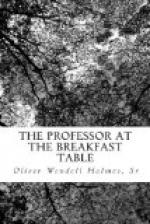An illustrious scholar once told me, that, in the first lecture he ever delivered, he spoke but half his allotted time, and felt as if he had told all he knew. Braham came forward once to sing one of his most famous and familiar songs, and for his life could not recall the first line of it;—he told his mishap to the audience, and they screamed it at him in a chorus of a thousand voices. Milton could not write to suit himself, except from the autumnal to the vernal equinox. One in the clothing-business, who, there is reason to suspect, may have inherited, by descent, the great poet’s impressible temperament, let a customer slip through his fingers one day without fitting him with a new garment. “Ah!” said he to a friend of mine, who was standing by, “if it hadn’t been for that confounded headache of mine this morning, I’d have had a coat on that man, in spite of himself, before he left-the store.” A passing throb, only,—but it deranged the nice mechanism required to persuade the accidental human being, X, into a given piece of broadcloth, A.
We must take care not to confound this frequent difficulty of transmission of our ideas with want of ideas. I suppose that a man’s mind does in time form a neutral salt with the elements in the universe for which it has special elective affinities. In fact, I look upon a library as a kind of mental chemist’s shop filled with the crystals of all forms and hues which have come from the union of individual thought with local circumstances or universal principles.
When a man has worked out his special affinities in this way, there is an end of his genius as a real solvent. No more effervescence and hissing tumult—as he pours his sharp thought on the world’s biting alkaline unbeliefs! No more corrosion of the old monumental tablets covered with lies! No more taking up of dull earths, and turning them, first into clear solutions, and then into lustrous prisms!
I, the Professor, am very much like other men: I shall not find out when I have used up my affinities. What a blessed thing it is, that Nature, when she invented, manufactured, and patented her authors, contrived to make critics out of the chips that were left! Painful as the task is, they never fail to warn the author, in the most impressive manner, of the probabilities of failure in what he has undertaken. Sad as the necessity is to their delicate sensibilities, they never hesitate to advertise him of the decline of his powers, and to press upon him the propriety of retiring before he sinks into imbecility. Trusting to their kind offices, I shall endeavor to fulfil—
—Bridget enters and begins clearing the table.
—The following poem is my (The Professor’s) only contribution to the great department of Ocean-Cable literature. As all the poets of this country will be engaged for the next six weeks in writing for the premium offered by the Crystal-Palace Company for the Burns Centenary, (so called, according to our Benjamin Franklin, because there will be nary a cent for any of us,) poetry will be very scarce and dear. Consumers may, consequently, be glad to take the present article, which, by the aid of a Latin tutor—and a Professor of Chemistry, will be found intelligible to the educated classes.




